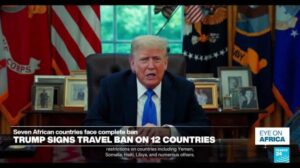
President Donald Trump has reissued a travel ban impacting citizens from 12 predominantly Middle Eastern and African countries. He has cited national security and public safety as the primary motivations behind the ban.
The new directive has stirred a storm of criticism and debate across the political spectrum.
Trump’s Travel Ban
The proclamation fully bars entry into the United States from Afghanistan, Myanmar, Chad, the Republic of the Congo, Equatorial Guinea, Eritrea, Haiti, Iran, Libya, Somalia, Sudan and Yemen. Additionally, partial travel restrictions have been placed on countries such as Burundi, Cuba, Laos, Sierra Leone, Togo, Turkmenistan and Venezuela.
This drastic measure applies to both immigrant and nonimmigrant entry, aiming to enhance security protocols concerning the vetting processes of foreign nationals.
The Justification Behind the Ban
The president attempted to justify the ban in a video shared on Truth Social, asserting, “We cannot have open migration from any country where we cannot safely and reliably vet and screen.”
He cited a recent event involving an Egyptian immigrant that escalated to violence in Boulder as emblematic of the dangers posed by foreign nationals. Ironically, Egypt remains off the list of nations directly affected by this new ban.
Trump said he tasked his cabinet with pinpointing countries featuring deficient vetting and screening information, warranting “a full or partial suspension on the admission of nationals from those countries.”
In his administration’s eyes, the justification rests heavily on raising concerns regarding terrorism and visa overstay rates, particularly for nations like Iran, Afghanistan, Libya and Somalia.
Exceptions
Despite the stringent regulations, the travel ban does encompass specific exceptions.
Lawful permanent U.S. residents, dual nationals traveling on a non-banned country passport, diplomats, athletes, adopted individuals and those with immediate family visas can still gain entry under certain conditions. Notably, Afghan nationals who have worked alongside U.S. forces and hold Special Immigrant Visas were also exempted from this travel ban.
Venezuelan Interior Minister Diosdado Cabello cautioned his citizens against traveling to the U.S. He warned, “Being in the United States is a great risk for anyone, not just for Venezuelans.” He labeled the U.S. government “fascist” and alleged that it unjustly targets citizens of his nation.
Conversely, Somalia’s ambassador to the U.S., Dahir Hassan Abdi, has expressed a commitment to maintaining a collaborative relationship with Trump and the U.S. He stated, “Somalia values its longstanding relationship with the United States and stands ready to engage in dialogue to address the concerns raised.”
The Backlash
The travel ban makes clear that no visas issued before 12:01 AM EDT on June 9 shall be revoked.
Critics have already begun voicing their discontent with the directive. For instance, Shawn VanDiver, president of the nonprofit group #AfghanEvac, lamented on behalf of U.S. veterans and allies, stating, “To include Afghanistan — a nation whose people stood alongside American service members for 20 years, is a moral disgrace. It spits in the face of our allies, our veterans, and every value we claim to uphold.”
